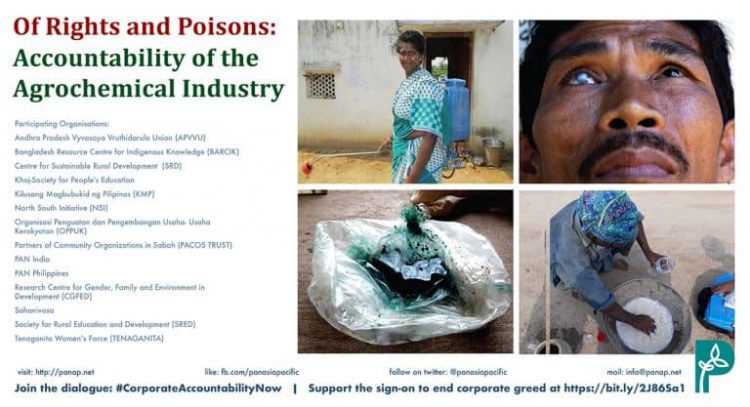PENANG, Malaysia – PAN Asia Pacific (PANAP) today released the results of seven-country study on the impact of highly hazardous pesticides (HHPs) on people’s health and the environment. The report’s launching coincided with the commemoration of International Day for the Eradication of Poverty.
The Penang-based group stressed that poor rural people are the most vulnerable to pesticide poisoning and that increased use of agrochemical worsens their poverty.
 The study “Of Rights and Poisons: Accountability of the Agrochemical Industry” revealed that HHPs remain widely used in the countries surveyed which include Bangladesh, India, Indonesia, Malaysia, Pakistan, the Philippines, and Vietnam with a total of 2,025 respondents involved.
The study “Of Rights and Poisons: Accountability of the Agrochemical Industry” revealed that HHPs remain widely used in the countries surveyed which include Bangladesh, India, Indonesia, Malaysia, Pakistan, the Philippines, and Vietnam with a total of 2,025 respondents involved.
Seven out of 10 of the respondents interviewed said they have suffered ill-effects due to pesticide exposure, said Ms. Sarojeni Rengam, Executive Director of PANAP and one of the authors of the report. Commonly reported health issues include respiratory, skin, cardiovascular, gastrointestinal, EENT (eye, ear, nose, throat), and neurological problems.
The report found that the agrochemical transnational corporations (TNCs), their subsidiaries as well as local pesticide manufacturers and distributors are producing and distributing HHPs that cause acute and chronic health effects particularly to children and other vulnerable people. These pesticides are also known to cause environmental damage and loss of biodiversity.
“It is clear that agrochemical corporations are responsible for violating the human rights to life and health; access to information; safe working environment; and livelihoods. They violate children’s rights, women’s rights, and indigenous peoples’ rights. All for the sake of profits,” Ms. Rengam said.
The situation is totally unacceptable, according to PANAP’s senior science and policy advisor Dr. Meriel Watts.
“Pesticides are a serious human rights issue that is not being adequately addressed at national, regional or international levels. This latest report shows that international agreements and treaties are not working. Industry stewardship programmes are a sham,” said Dr. Watts.
Dr. Watts noted that poverty is often characterised by malnutrition, which can worsen the effects of pesticides. “Pesticide poisoning aggravates the cycle of poverty and ill health and the malnourished become less able to provide food for themselves,” she stressed.
As farmers resort to more toxic pesticides, to increased spraying, or to dangerous cocktails, health impacts are not just intensified. Many also fall into debt and poverty to keep up with increasing use of expensive chemicals and crop loss.
PANAP renewed its call on the global community to negotiate a global legally binding treaty that phases out HHPs and replace them with agroecology. Such treaty should pave the way to the dismantling of TNCs’ power over the United Nations (UN), governments and farmers.
“Under this treaty, the industry will be held accountable for the human and environmental impacts of their pesticides and containers. It will also stop the double standards of countries banning pesticides but are still manufacturing them for export,” added Ms. Rengam.
While poverty has various dimensions, addressing pesticides’ serious impacts on people’s physical and economic wellbeing could go a long way in helping eradicate global poverty, which is most felt in the rural areas, the PANAP official argued.
For her part, Dr. Watts urged “all countries in the region to rapidly phase out highly hazardous pesticides and assist farmers to convert to agroecology – for the sake of the farmers and workers, their children, future generations, the environment, and society as a whole including the countries’ economies and to help alleviate the state of hunger and poverty among the rural poor.”
The results of the study were generated through PANAP’s Community Pesticide Action Monitoring (CPAM) as well as fact-finding missions. CPAM is a participatory action research approach to document and create awareness on pesticide impacts on human health and the environment. It involves community members who undertake the research, and encourages organizing and action. ###
Contact: Ms. Sarojeni Rengam, Executive Director, sarojeni.rengam@panap.net or Milagros S. Serrana, Programme Officer, mila.serrana@panap.net
- Join the call to “End corporate greed! Rights now!” by signing the petition at http://bit.ly/2tduVyj
- Join the dialogue #EndCorporateGreed, #CorporateAccountabilityNow, and #PesticidesFreeWorld
Download the report from this link: http://files.panap.net/resources/Of-Rights-and-Poisons-Accountability-of-the-Agrochemical-Industry.pdf








Discussion about this post